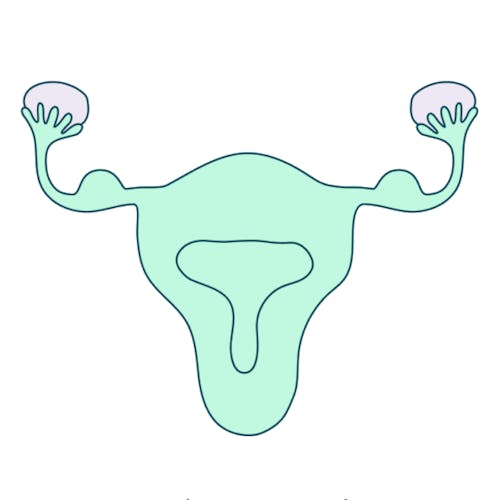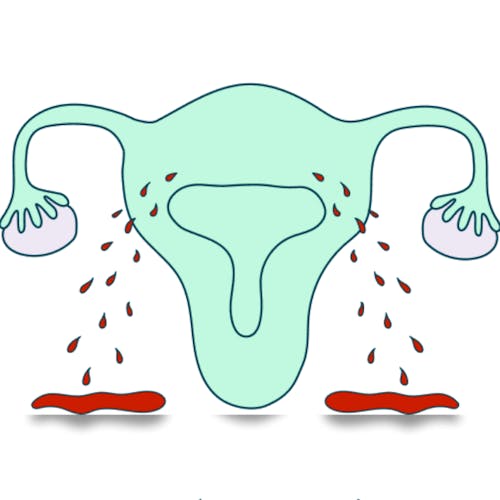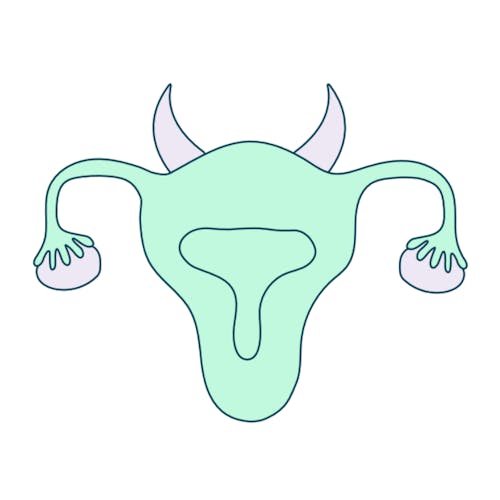This website uses cookies to enhance the user experience. By using Yoppie you are agreeing to our use of cookies.
Ovulation Phase 101: What symptoms to expect, and how to optimise this time
Written by Yoppie
13 Jun 2022
What is the ovulation phase?
When does ovulation happen?
What is happening to my body?
What symptoms am I likely to experience?
Is it normal to feel pain during this time?
When am I most fertile?
What could be causing fertility problems?
How can I optimise this phase?
We’ve reached the last in our series on the menstrual cycle phases, and though ovulation is the shortest phase, it’s going to be super important if you’re trying to get pregnant. Let’s look at ovulation and find out what's going on in your body, what signs and symptoms you might experience, and how to make the most of it.
What is the ovulation phase?
Put simply, this phase is the one that helps you conceive. Oestrogen levels rise throughout the follicular phase and eventually trigger the pituitary gland to release LH (luteinising hormone) and start the ovulation process.
During this time, one of the ovaries will release an egg which will make its way down the fallopian tube to the uterus. If the egg is fertilised by sperm, it will cling to the walls of the uterus and develop. Although you can still become pregnant by having sex at other times in your cycle, the ovulation phase is thought to be the most likely time for conception.
When does ovulation happen?
This phase occurs at different times for everyone, but in a standard 28-day cycle, ovulation will happen at around day 14, and typically lasts for a teeny tiny 24-hour window.
What is happening to my body?
It’s an intricate process, and quite amazing! Usually one egg will travel to the uterus, but sometimes two can end up there if both ovaries produce an egg. The egg survives around 24 hours and takes up much of that time travelling down the fallopian tube, so it must be fertilised pretty quickly.
What’s really cool is the body prepares itself for conception by opening the cervix more to allow sperm to get in easier, and raising the body temperature just a smidge because the sperm prefer it warm.
What symptoms am I likely to experience?
Although the ovulation process lasts just 24 hours, the hormones surrounding this process can stay elevated for 3-4 days. A spike in oestrogen can give you more energy, and higher testosterone levels can cause you to feel more extroverted than usual… time to get out on the town! Or at least make all those phone calls you’ve been avoiding.
The symptoms you may notice during the ovulation phase include:
- More cervical mucus than normal
- An increase in body temperature
- Breast tenderness
- Bloating or mild tummy pain
- Spotting
- Increased sex drive
Is it normal to feel pain during this time?
Ovulation pain (also known as Mittelschmerz) can occur for some people, and usually feels like a mild discomfort in the pelvis or mild cramps before or during ovulation. It’s believed this happens when the follicle bursts to produce the egg. However, none of the pain associated with ovulation should be intense or debilitating. If you are experiencing extreme pain related to your cycle, go see your doctor to find out what’s causing it.
When am I most fertile?
If you are trying to get pregnant, you may be interested in finding out the best time to have sex during the month. It’s thought on average, those with a regular menstrual cycle will ovulate at some point between day 11 and day 21 of their cycle, which means their fertile days could fall between day 8 and day 21. For reference, day 1 is the first day of your period.
This is quite a large window, which is why some people find it difficult to pinpoint the best time and fall pregnant. There are at-home ovulation testing kits to help, but starting to track your cycle and your possible ovulation days can help. If you’ve been trying for a while, you can also speak to your doctor to find out more.
What could be causing fertility problems?
If you have been tracking your ovulation and struggling to get pregnant, you may notice your ovulation doesn’t happen as planned - or perhaps not at all. There are many reasons this could be happening, from stress to diet, but some common ovulation disorders include:
- Polycystic ovary syndrome (PCOS) - this causes a hormone imbalance and can affect the ovulation process
- Hypothalamic dysfunction - excess emotional or physical distress can cause disruption of the two hormones responsible for stimulating ovulation; follicle stimulating hormone (FSH) and luteinising hormone (LH)
- Primary ovarian insufficiency/Premature ovarian failure - often caused by an autoimmune response and results in a premature loss of eggs in the ovaries
- Excess prolactin - when the pituitary gland produces too much prolactin (hyperprolactinemia) and as a result lowers oestrogen production
How can I optimise this phase?
Your body and mental health will usually be at their best during this phase in your cycle, arguably for evolutionary reasons; the better you feel, the more likely you are to have sex! Luckily, whether or not you are looking to get pregnant, you can use these increased positive feelings to your advantage by scheduling in your most intense workouts while you have the extra energy, planning all those work meetings for when you’re most confident, and booking in dinner with friends while you’re living your best life. And of course, if you are trying to get pregnant… have lots of sex!
Want to know if you could be ovulating right now? Our website has a short Learn Your Phase questionnaire to help you learn more about your cycle. We love to help people tackle the symptoms associated with the entire cycle - not just the bleed days - so whatever your symptoms or cycle goals are, we’ve got you.
Do you have a question about the ovulation phase? Ask in our Full Stop FB group, or reach out to the team on IG at @itsyoppie so we can help.
Don't forget that our personalised menstrual cycle subscription box can get organic tampons, PMS supplements and much more delivered easily and regularly through your letterbox, to give you just a bit more peace of mind each cycle.
Section jump
Back to top
Subscribe To Our Newsletter
YOPPIE





© 2026 Yoppie is a registered trademark of Phlo Technologies Ltd.
Yoppie's supplements are not a substitute for a varied diet and healthy lifestyle and are not intended to diagnose, treat, or cure any disease. If you are pregnant, breastfeeding, have a medical condition or are under medical supervision, please consult with your doctor before taking any of our products.






